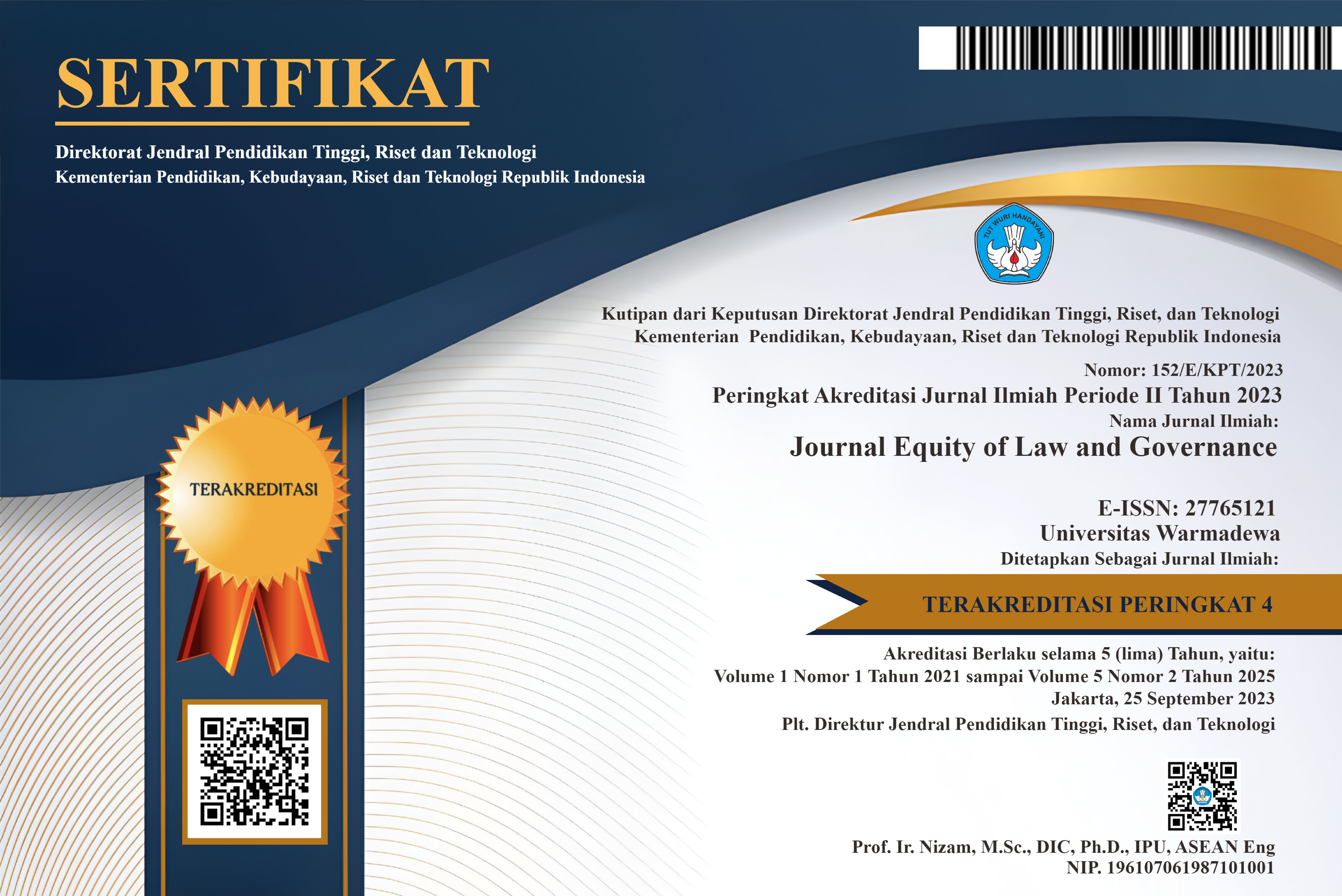Strengthening Traditional Villages as Legal Subjects in Tourism Business Management in Bali
Abstract
This study explores the elevation of customary villages' status as legal entities in managing the tourism industry in Bali. Through philosophical, sociological, and empirical legal perspectives, this study investigates the challenges faced in regulating tourism on the island. An empirical legal framework approach is utilized with multi-approaches, relying mainly on the philosophical, historical, and case approaches. The development of the cultural tourism industry in Bali highlights the importance of strengthening local wisdom. The focus of this research includes fundamental questions such as the essence of strengthening customary villages as legal entities in managing the tourism industry, as well as mechanisms that contribute to the strengthening of customary villages in the realm of tourism management. The findings confirm that customary villages play an integral role in directing the tourism industry, by upholding customary laws and pararems and recognizing the unity of customary law communities. This highlights the importance of environmental preservation through Tri Hita Karana principles. Modernization of tourism business management includes digital strategies and the merging of traditional markets with modern markets, with an emphasis on traditional village branding. Strengthening indigenous villages in tourism business management requires cooperation between indigenous villages and the Bali Provincial Government, including profit-sharing schemes. Indigenous villages need capital strengthening through the Village Credit Institution (LPD). The success of tourism management led by indigenous villages depends on the use of customary law as a source of legal certainty in managing tourism based on the principles of Pancasila and Tri Hita Karana. Concrete recommendations include the formulation of tourism management standards involving HR, financial management, tour guides, and service standards. This approach aims to encourage sustainable tourism practices and maintain culture in Bali's Indigenous Villages.
References
Antara, I. B. K. S. (2022). Eksistensi dalam Globalisasi: Peran Wisata Kuliner dalam Pengembangan Pariwisata Berkelanjutan di Sanur. Jounal of Tourism and Interdisciplinary Studies (JoTIS), 2(1), 11–20. https://doi.org/https://doi.org/10.51713/jotis.v2i1.64
Artadi, I. K. (2012). Hukum Adat Bali dengan Aneka Masalahnya. Pustaka Bali Post.
Dharmayuda, I. M. S. (2001). Desa Adat: Kesatuan Masyarakat Hukum Adat di Provinsi Bali (1st ed.). Upada Sastra.
Ernawati, D. P., Suwetha, I. G. N., Surya, I., & Widagda, I. G. P. (2019). Analisis Sinergitas Desa Pekraman dan Desa Dinas dalam Peningkatan Partisipasi Masyarakat pada Pembangunan Desa di Provinsi Bali.
Nurtjahjo, H., & Fuad, F. (2010). Legal Standing Kesatuan Masyarakat Hukum Adat. Salemba Humanika.
Pratiwi, A. F. (2014). Pengaruh Pengembangan Wisata Bahari terhadap Aktivitas Perikanan dan Strategi Nafkah Nelayan Tanjung Benoa [Skripsi]. Institut Pertanian Bogor.
Rideng, I. W. (2020). Sengketa Dalam Desa Adat, Peran Majelis Desa Pakraman dalam Penyelesaian Sengketa antar Desa Pakraman di Bali (1st ed.). Pena Persada.
Soekanto, S. (2010). Penelitian Hukum Normatif: Suatu Tinjauan Singkat (1st ed.). Raja Grafindo Persada.
Suwardani, N. P. (2015). Pewarisan Nilai-nilai Kearifan Lokal untuk Memproteksi Masyarakat Bali dari Dampak Negatif Globalisasi. Jurnal Kajian Bali, 5(2), 247–264.
Suwitra, I. M., Selamet, I. K., & Datrini, L. K. (2020). Penguatan Kapasitas LPD Desa Adat di Bali melalui Penyuratan Awig-Awig. Jurnal Hukum & Pembangunan, 50(3), 676–688. https://doi.org/10.21143/jhp.vol50.no3.2585
Widyastini, T., & Dharmawan, A. H. (2013). Efektivitas Awig-Awig dalam Pengaturan Kehidupan Masyarakat Nelayan di Pantai Kedonganan Bali. Sodality: Jurnal Sosiologi Pedesaan, 1(1), 37–51.
Yanuarta, I. W. A. (2018). Tradisi Mekare-kare di Desa Bali Aga Tenganan Pegringsingan dalam Fotografi Dokumenter [Skripsi]. Institut Seni Indonesia Yogyakarta.
 Abstract viewed = 43 times
Abstract viewed = 43 times
 PDF downloaded = 46 times
PDF downloaded = 46 times













